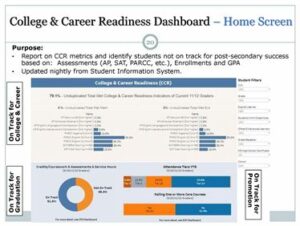Data systems provide educators with measurable data over time for individual students and student groups.
success for everyone
BUILDING SUCCESSFUL DATA SYSTEMS
To create pathways to adult success, communities need information about where and why students fall or are falling off-track to high school graduation and about the access students have to pathways for secondary schooling and job training. Additionally, communities need to have access to information about success rates in postsecondary schooling and training. Finally, there is a need for data that shows how many young adults are successfully making the transition from postsecondary schooling and training to careers with family supporting wages. Currently this data, if collected at all, is limited. Communities, K-12, higher education, and the workplace need to pool their information and provide accessible data which tracks cohorts of students.

Student Support Systems
Postsecondary Navigation
Cross-Sector Collaborations
recommendations
BUILDING EWS DATA SYSTEMS
Data systems provide educators with measurable student data.They focus on indicators that are both highly predictive of students’ chances for adult success and subject to modification through the actions of educators and other concerned adults.
A PAS workgroup comprised of education data, research, and technology experts from school districts, state departments of education, technology companies, and nonprofit organizations developed the following guidance for EWS 2.0 data systems, and the considerations for districts and states, as they develop and improve their data systems.

BUILD AN EWS DATA SYSTEM
Robust, accurate data systems are essential for educators to identify students who need support, to determine the proper supports, and to evaluate program implementation and efficacy over time.

STANDARDS FOR PREDICTIVE INDICATORS
PAS workgroup guidance on standards for predictive indicators.

ANALYSIS/ROOT CAUSES AND STRATEGIC ACTIONS
The EWS 2.0 workgroup’s recommendations for conducting a root cause analysis of student needs and determining effective strategies for supporting students toward high school graduation and postsecondary learning.

STANDARDS FOR ACTIONS
Guidance on standards for action and EWS 2.0 systems strategies.

ROLES OF SCHOOL/DISTRICT LEADERS AND TEAMS
One of the strongest recommendations from PAS members who have substantial experience working with EWS 2.0 at the school, district, and state levels is that to be effective, EWS 2.0 needs strong and supportive leadership from principals and districts to develop effective EWS 2.0 teams in schools.
IMPACT
PAS in Action!
Considerations for Developing Your Data System
Data system developer Eric Meredith (MT), Robin DeLoach (OR), and Ellis Ott (AK) share their experiences in developing flexible early warning systems based on stakeholder needs. Join us to learn about key decision points and considerations in developing a system from a state, district, and intermediary organization perspective. We will also discuss how to build and maintain support for the system within your context. Implications from this session can be applied to building an EWS that moves beyond the traditional ABCs. Facilitated by Sarah Frazelle
Data System and Their Use
Eric Meredith shares his experiences in developing flexible early warning systems based on stakeholder needs. He discusses key decision points and considerations in developing a system from a state, district, and intermediary organization perspective. Also discussed is how to build and maintain support for the system within your context. Implications from this session can be applied to building an EWS that moves beyond the traditional ABCs. Facilitated by Sarah Frazelle
Data System and Their Use, Pt. 2
Robin Deloach shares her experiences in developing flexible early warning systems based on stakeholder needs. He discusses key decision points and considerations in developing a system from a state, district, and intermediary organization perspective. Also discussed is how to build and maintain support for the system within your context. Implications from this session can be applied to building an EWS that moves beyond the traditional ABCs. Facilitated by Sarah Frazelle
Partner Initiatives
Check out the data systems initiatives the PAS Partners have implemented in their schools or districts.
CORE Districts & New Visions

Sample data visualizations from CORE Districts & New Visions: a regional district collaborative and a non-profit support partner.
Evansville Vanderburgh School Corporation

Data dashboards to support the Evansville Vanderburgh School Corporation OptIN program, “Bringing Learning to Life.”
Baltimore City Schools: Data Displays

Data displays from Baltimore City Schools‘ new interactive student success dashboard.

Community of Practice 2025 Learning Series
Ready to transform your approach to improvement work in your school? Our partners at the GRAD Partnership is offering a four-part interactive learning series is designed to help you harness the power of data, elevate student voices, and implement meaningful, student-centered strategies to improve student success in your school. This isn’t just another workshop series—it’s a transformative journey designed to elevate your improvement work, empower your team, and drive better student outcomes. Learn more about the Learning Series
PAS Solution Forums
Since 2020 members of the PAS community have shared the initiatives they’ve implemented in their schools or community to advance student success. All forums have been recorded and the videos and supporting resources are available to download.

Designing Education
A podcast hosted by Robert Balfanz, director of the Everyone Graduates Center.
Conversations with leaders in education from around the country on bold new ideas and research-based strategies for redesigning American education to more effectively engage all students and equip them for the challenges of today’s workplace and world.

